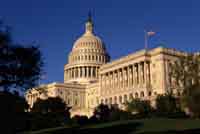Government Resources

- Federal Communications Commission - The Federal Communications Commission (FCC) is an independent United States government agency, directly responsible to Congress. The FCC was established by the Communications Act of 1934 and is charged with regulating interstate and international communications by radio, television, wire, satellite and cable. The FCC's jurisdiction covers the 50 states, the District of Columbia, and U.S. possessions.
- Library of Congress - The Library's mission is to make its resources available and useful to the Congress and the American people and to sustain and preserve a universal collection of knowledge and creativity for future generations. The Office of the Librarian is tasked to set policy and to direct and support programs and activities to accomplish the Library's mission.
- Supreme Court - The Supreme Court consists of the Chief Justice of the United States and such number of Associate Justices as may be fixed by Congress. The number of Associate Justices is currently fixed at eight (28 U. S. C. §1). Power to nominate the Justices is vested in the President of the United States, and appointments are made with the advice and consent of the Senate.
- THOMAS - Legislative Information on the Internet - THOMAS was launched in January of 1995, at the inception of the 104th Congress. The leadership of the 104th Congress directed the Library of Congress to make federal legislative information freely available to the public. Since that time THOMAS has expanded the scope of its offerings.
- U.S. Department of Education - ED was created in 1980 by combining offices from several federal agencies. Its original directive remains its mission today — to ensure equal access to education and to promote educational excellence throughout the nation.
- U.S. Senate
- U.S. House of Representatives
- The White House
